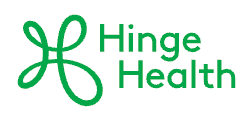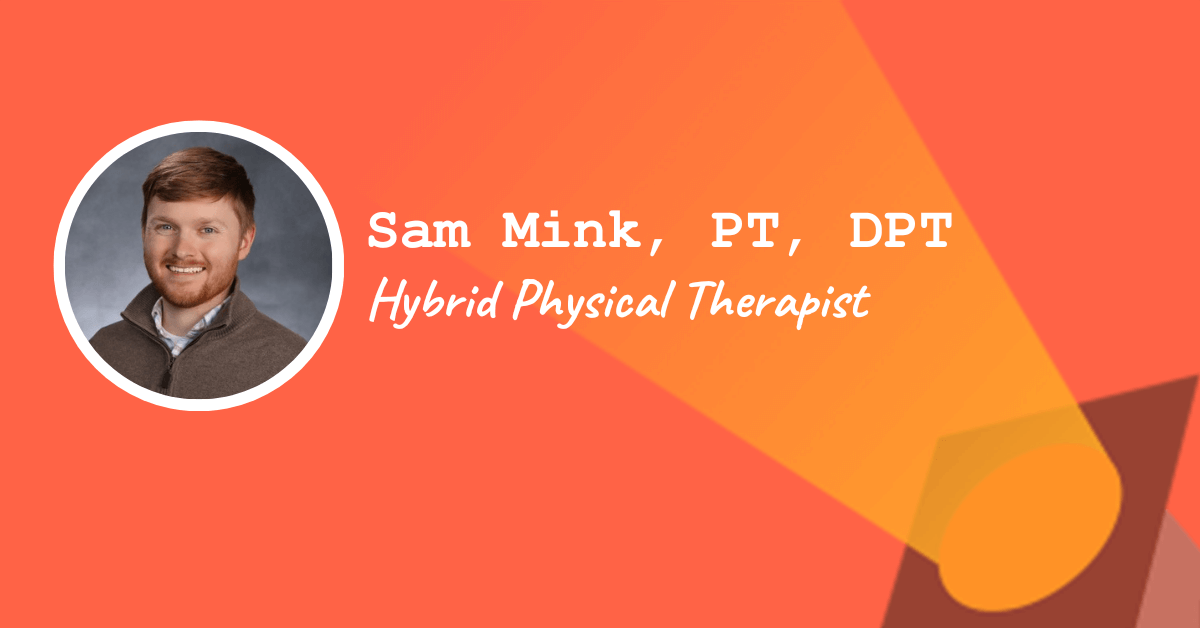This week’s spotlight is on Sam Mink, PT, DPT, a non-clinical PT who is now Hybrid Physical Therapist at Hinge Health!
This post may contain affiliate links or codes. This won’t increase your cost, but it helps keep TNCPT alive, and free of annoying ads! Thank you for your support. 🙂
What is your full name, title, and company name for your current, primary role?
Sam Mink, PT, DPT — Hybrid Physical Therapist at Hinge Health

Where are you located?
Hoschton, GA.
Where did you go to PT school, and what year did you graduate?
South College, 2020.
Please refrain from contacting our spotlight participants on social media. There are thousands of readers just like you out there. 🙂 Please ask your questions in the comments on this blog post.
If you’re a Non-Clinical 101 student, you can network with many of our spotlight participants in the alumni groups!
What did you do when you first finished school, and for how long?
Right after school, I started working for a local outpatient orthopedic physical therapy company. I was a float PT at first, working in a few different clinics in my area, until I landed in my full-time clinic. I worked in that outpatient clinic for about two years before starting with Hinge Health.
In what setting(s) did you work, and what types of patients did you treat?
I primarily worked in outpatient orthopedics. I mostly saw chronic pain and orthopedic post-surgical patients. I was also one of the few clinicians in my clinic that treated vestibular conditions, as well as temporomandibular conditions.
What did you enjoy about your early roles? What didn’t you enjoy?
I really enjoyed working with and building relationships with my teammates in the clinic, as well as having face-to-face time with my patients. I also loved being involved in the mentorship of student physical therapists and physical therapist assistants.
Over time, however, the caseload that I had to support began to increase, causing me to spend less time with each patient. Also, it began putting a strain on me at home, as I had to complete hours of documentation when I got home each day.
When and why did you decide to do something non-clinical?
After experiencing burnout and poor work-life balance due to the work conditions, I decided to look into a non-clinical role. I also found out that my wife was pregnant with our first child, and I wanted to make it a priority to be there for my son as much as possible.
What are you doing these days?
Currently, I work as a hybrid physical therapist at Hinge Health. Outside of work, I enjoy spending time with my wife, son, and pets!
Are you still treating patients, or are you solely non-clinical?
I still treat patients via telehealth physical therapy, but I also perform non-clinical roles that help support and improve our digital MSK platform.
How long have you been in your hybrid physical therapist role?
I started my position at Hinge Health in September 2023.
Did you get any special certifications or training along the way to help you get into your current role?
When I initially started to research other possible opportunities, I took some of the crash courses—specifically, Customer Success and Telehealth—through The Non-Clinical PT! This is where I realized that telehealth was the right direction for me and my career!
I also read a lot of The Non-Clinical PT’s articles on their website. These were great in giving me some tips on resume writing. I also took some generalized customer success courses through Udemy, as well as telehealth courses through MedBridge.
Do these crash courses sound interesting to you? Get them, plus 25 more in Non-Clinical 101!
How did you find your hybrid PT job? Did you apply or find it through a connection?
I found my job on LinkedIn.
Did you do anything special to your resume to land the job?
From The Non-Clinical PT’s resources I mentioned above, I learned how to write my resume in a way that highlighted my skills and related them to the job I was applying for.
What was the interview like for the hybrid physical therapist role?
The interview process for my current role was very different from the other clinic-based jobs I have interviewed for in the past. Instead of just one meeting and an offer like my other clinic-based jobs, I interviewed with multiple people that worked at Hinge Health, all at different levels in the company.
They asked thought-provoking questions, answered all of my questions thoroughly, and made sure that my philosophy as a physical therapist matched their standards at Hinge Health.
How have people reacted to you leaving patient care?
People have reacted very positively to my switch, as they have seen just how much it has changed me and my demeanor!
I have had a few people question my decision, but they came to understand why I left clinic work after hearing my story.
What’s a typical day or week in the life like for you? What types of tasks and responsibilities fill your time?
A typical day at Hinge Health consists of performing synchronous and asynchronous tasks that directly involve patient care, organizational meetings, and coworker support.
What are some of the rewards of your role? What are the biggest challenges?
I love that I can provide high-quality care to patients while not sacrificing time with my family.
Also, I love that I have the opportunity to collaborate with other groups within Hinge Health. This allows me to use my skills to, not only help patients directly, but also influence widespread change in the virtual physical therapy industry!
The main challenge is that the virtual physical therapy industry is rapidly changing, so I have to be ready to adapt and change daily.
How did your clinical background prepare you for this role? Which skills transferred?
Since patient care is at the core of my job, my experience in direct patient care prepared me greatly for this role. Since I had prior telehealth experience, I already had a feel for this mode of patient-care delivery as well.
Also, being able to work in a fast-paced environment, such as an outpatient clinic, showed that I can take the stresses of an ever-changing field like virtual healthcare.
What type of person do you think would do well in your role?
A person who deals with change well and is willing to jump outside traditional roles will do well in this role.
This is not a typical PT job. Anyone interested in this job needs to be willing to learn and adapt to the ever-changing conditions in this industry.
Do you work remotely or onsite?
I work remotely.
Did you read any books, take any courses, or do anything special overall to get you where you are today?
I made sure to do my research on exactly what is required of me within the technology industry.
I also participated in a hiring open house hosted by Hinge to get more information about the company and the role itself.
I made sure that it aligned with my values, interests, and career trajectory.
What is a typical career path for someone in your hybrid physical therapist role?
There is no typical career path for this role, but this invites opportunity for expanding in many potential directions as the industry grows.
What is next for you? What are your high-level career aspirations?
Since working for Hinge Health, I have fallen in love with the virtual healthcare industry!
It has the potential to be a convenient and effective source of healing for so many people experiencing pain.
I will continue to develop my clinical knowledge and skills in order to promote the growth of this young industry. I strive to see Hinge Health make a difference in every life we touch.
What would you like to change most in your profession, and why? How would you propose doing so?
I would like to make physical therapy more accessible for everyone. Too often in the clinic, I saw people miss appointments due to outside forces, such as transportation issues or work conflicts, which, in turn, limited their progress.
What career advice would you give yourself that you wish you had during school?
Don’t be afraid to step out of your comfort zone. There might just be a world outside of it that is better than the one inside of it.
What would you teach to today’s graduate students in your profession, if you had the opportunity?
I have a growing interest in the science of pain, so I would love to teach pain neuroscience and how to effectively explain it to a patient in a way they can understand.
Do you have any special advice for others who want to follow in your footsteps?
Do not let rejection discourage you! Use it as a motivator for your next application and interview.
Learn from your mistakes. Always ask for feedback, even if it is sometimes hard to take.





